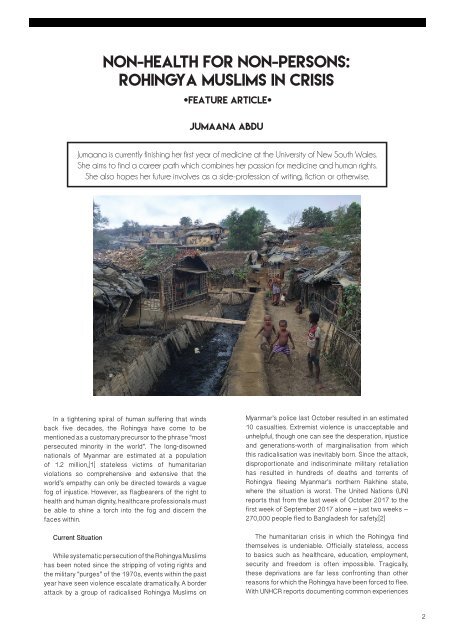Vector Volume 11 Issue 2 - 2017
Create successful ePaper yourself
Turn your PDF publications into a flip-book with our unique Google optimized e-Paper software.
Non-Health for Non-Persons:<br />
Rohingya Muslims in Crisis<br />
[Feature article]<br />
Jumaana Abdu<br />
Jumaana is currently finishing her first year of medicine at the University of New South Wales.<br />
She aims to find a career path which combines her passion for medicine and human rights.<br />
She also hopes her future involves as a side-profession of writing, fiction or otherwise.<br />
In a tightening spiral of human suffering that winds<br />
back five decades, the Rohingya have come to be<br />
mentioned as a customary precursor to the phrase “most<br />
persecuted minority in the world”. The long-disowned<br />
nationals of Myanmar are estimated at a population<br />
of 1.2 million,[1] stateless victims of humanitarian<br />
violations so comprehensive and extensive that the<br />
world’s empathy can only be directed towards a vague<br />
fog of injustice. However, as flagbearers of the right to<br />
health and human dignity, healthcare professionals must<br />
be able to shine a torch into the fog and discern the<br />
faces within.<br />
Current Situation<br />
While systematic persecution of the Rohingya Muslims<br />
has been noted since the stripping of voting rights and<br />
the military “purges” of the 1970s, events within the past<br />
year have seen violence escalate dramatically. A border<br />
attack by a group of radicalised Rohingya Muslims on<br />
Myanmar’s police last October resulted in an estimated<br />
10 casualties. Extremist violence is unacceptable and<br />
unhelpful, though one can see the desperation, injustice<br />
and generations-worth of marginalisation from which<br />
this radicalisation was inevitably born. Since the attack,<br />
disproportionate and indiscriminate military retaliation<br />
has resulted in hundreds of deaths and torrents of<br />
Rohingya fleeing Myanmar’s northern Rakhine state,<br />
where the situation is worst. The United Nations (UN)<br />
reports that from the last week of October <strong>2017</strong> to the<br />
first week of September <strong>2017</strong> alone – just two weeks –<br />
270,000 people fled to Bangladesh for safety.[2]<br />
The humanitarian crisis in which the Rohingya find<br />
themselves is undeniable. Officially stateless, access<br />
to basics such as healthcare, education, employment,<br />
security and freedom is often impossible. Tragically,<br />
these deprivations are far less confronting than other<br />
reasons for which the Rohingya have been forced to flee.<br />
With UNHCR reports documenting common experiences<br />
2

















